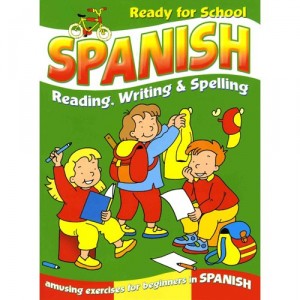Skilled Raeders Can Raed Things Spleled Very Bdadly
Aoccdrnig to rscheearch at an Elingsh uinervtisy, it deosn’t mttaer in waht oredr the ltteers in a wrod are, the olny iprmoetnt tihng is taht frist and lsat ltteer is at the rghit pclae.
The rset can be a toatl mses and you can sitll raed it wouthit porbelm. Tihs is bcuseae we do not raed ervey lteter by itslef but the wrod as a wlohe.
————————————————
If you can read English well, you probably had no problem reading the previous paragraph. Amazing, yes?
That turns every English department upside down. So we don’t have to know how to spell every word in the dictionary.
Death to the Spelling Test!
It turns out that once you learn to read a language well, you look at the whole word, not the letters. This is why you can still understand words with terrible spelling.
You can have a lot of fun with this (and drive your Spanish teacher nuts at the same time) by making your own crazy-spelled words and then show them to your teacher, the next time he or she wants you to take a spelling test.
That doesn’t mean that spelling is completely unimportant though! Standard spelling is indeed useful for some things.

From the very beginning, young students are drilled in reading, writing, and spelling in any language — even Spanish.
Language Learning Has to Start Somewhere
It’s all about basic spelling. So when studying Spanish, for instance, be sure you sound out your words, especially when it comes to reading and writing.
But once you pass that ‘first’ stage, don’t get discouraged when you can’t remember how to spell ‘lamentablemente’ (a major mouthful). It matters more that you understand the word. That is ultimately what language learning is all about: understanding.
So Is Sleplling Improtent?
For beginners, yes. For intermediate users, not so much.
Mark Twain once said, “It’s a very small mind that can only think of one way to spell a word.”
It is, however, improtant to udnerstnad taht there’s so mcuh mroe we can lrean aobut raednig and lnagauge laernnig….
So be prepared.
Please Tweet This Article
If you liked this article please share it with your friends on Twitter by tweeting the message below.
Spelling Doesn’t Matter When Learning a Language
https://language101.com/spelling
Please r/t

 Login
Login
Do you have a course in Italian?
Jill –
Yes! It is nearing completion. Please check out the available information at learn-italian.language101.com
Thomas
Hi there,
I’m from Mexico and would like to try your method learning english.
Do you have a course in English ?
Regards,
Luis –
We are gathering together the necessary data to get that project underway! It will be great when each language is able to be learned back and forth.
You say that this professor has claimed that spelling is unimportant , however , that is usually if you have learne to read early in life and not latter. Many people like myself because of things like dyslexia , didnt learn to read untill age 9 or so. The first several sentences you typed were very difficult to puzzle through for this type of individual. I can not speed read , or comprohend multiple words at once. What would you suggest for learning to read a different language for these type of individuals.
Lara –
As with any difference in learning comprehension each individual must determine what their ideal is and work within that structure. Dyslexia is a challenging mental re-organization to first overcome. Once your mind began sorting out the shapes you were able to more fully integrate what was being presented with what you perceived, correct? Something similar happens with text as exampled above. The first time I read that I had a hard time with it. Each time I look at it I attempt to read each word individually and it hinders my progress to comprehend. When I look at each block of words my mind then sorts out the contextual meaning in addition to the literal word and I can speed right through it with full comprehension.
As for learning to read a different language – the same challenge will be presented if the mind is attempting to discern the actual shape being perceived. It is possible, however, that a mind which is dyslexic in the Latin (english) alphabet might actually key right into something very different such as cyrillic characters, japanese kanji or arabic script.
We are all vastly different and doing our best to fit everyone into the same conceptual brain model. Maybe the key is to fit ourselves into the model that works best for our individuality.
I learned German as a foreign language starting in college. After about 6 years of study, I was working on my Masters degree in German at Middlebury College summer language school. One day in my advanced language practice course the native speaker professor handed out a photocopy of a text that we were to read for homework. We all took it and left the classroom. That evening all of us nearly went out of our minds trying to decifer the text because she had cut off the FIRST LETTER ONLY of each line of text when she made the photocopy. I later took a text of my native language and cut off the first letter of each line and I was – as you demonstrated above – able to easily read the text, without hesitation. This proved to me that it is the experience speaking and listening to a language that enables us to understand: most of comprehension is expectation based on prior experience. At that point in time I had had very little experience using the target language to talk about anything abstract. Therefore I did not have enough experience to fill in even that one letter!
Another experience: I have two children who have grown up bilingual. They both attended German schools. I had decided to let my son get a grip on reading in German, before I would attempt to teach him to read English – I assumed I would have to TEACH him to read English at a later date. I had always read to them in both languages, so we had a lot of English children’s books lying around. One day sometime during the first year in school, I caught my son studying an English book. I asked him what he was doing and he said he was reading. I asked him to prove it and sure enough, he read the page of a beginning English reader to me! Evidently, once he got the concept of how to read – even though it was in a different, much more phonetic language – he was able to figure out the text of the other language which he could speak and understand, just by recognizing a few letters in each word. His language experience allowed him to fill in the rest. I never sat and sounded out words with either of my children in English. They were taught to read German in school, and reading English is something that just came as by-product. One of them is a voracious reader – but the other only ever read comic books in either language without being forced! So we have the full range of types of learners covered. Later, it became evident that the comic-book-fanatic read in a completely different way than the voracious-reader. The former sounded out every word afresh, relying heavily on sound-symbol coordination. He often didn’t recognize that the same word kept appearing over and over on the same page. The other child read the entire word like a picture, and often mispronounced words in English that he had only read, but never heard said aloud, showing that he had memorized the spelling of the word correctly! Anyway – having children is great for studying the processes of learning!
Kathy –
These are great examples of how fluency and learning are modeled. Cutting off the first letter of every line certainly can pose its challenges. This is partly because, just like the splleing article above, as we gain comprehension of phrases we can start to read the entire phrase as a single object instead of all the words individually. This is a secret of speed reading – stop looking at the individual words and begin looking at the lines or phrases as a whole complete object.
As the phrases begin to congeal we can slightly re-arrange the words and have the thought structure make sense.
Re-arranging the words in a structure can make sense by congealing the thought into phrases..
Thoughts can be put into phrases and sense can be made within the structure through the congealing of the words.
You may notice that these phrases hold slightly different resonances yet for the most part they convey the same message – we can read through the garble and get the message regardless of order so long as the key markers are present.
One of the reasons why Language101.com’s software works as well as it does is due to the way humans learn conversational language – we begin to repeat the words and phrases we hear and then get praised for doing better and better each time! After we get enough phrases into our minds we can begin to read new ones through the context clues of what we do recognize. It’s quite fascinating how the neural network can start making new connections in places we once considered uncorrelated. As an English speaking person we are able to take simple phrases such as ‘Hello, how are you?’ and translate into another language (in this case, spanish) ‘Hola, como estas?’ Because the word order is similar it is an easy one to remember and integrate.
Thomas
Thomas,
Re: Skilled Raeders Can Raed Things Spleled Very Bdadly
Greetings from Shenzhen, China PR
Several years ago as an English teacher in a local Shenzhen tertiary college, I copied a similar tract and had my students read aloud the projection along with me. To my amazement I found I had to speed up as the whole class (aged 19-20) seemed to be reading a lot faster than I was – bad class ;-) I wondered at the time whether the structure of Chinese script made it easier or whether it was the ‘pinyin’* they studied in primary school? I refused to accept it was just blind luck since I tried this exercise on all three classes same, same. Some of the above comments are of considerable enlightenment to me now !
I’d certainly be very interested in an English module to trial on some of my young trainees who can write quite well but need confidence to speak competently. So, if I can help in any way, please feel free to “shout” in my direction.
Colin
*http://www.bbc.co.uk/languages/chinese/real_chinese/mini_guides/pinyin/